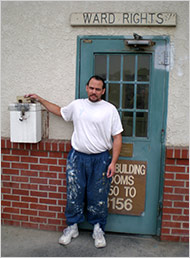 long time no blogging — i’m feeling a little guilt about that, but it is trumped by feeling overwhelmed by my schedule and projects these days. we’re on a quarter system at oregon state, so we’re just entering week 5 of our spring quarter and hitting midterms. as i wrote about earlier, i’m still holding an informal class in the girls’ correctional facility one night a week, and i’m also teaching the first inside-out class in a new (to the program) prison one night a week. i’m also trying to organize community service-learning projects for my 45 delinquency students, which is a huge hassle but will hopefully be worth it. i guess all of that is to say i’m still committed to public criminology, but most of it is incorporated into my teaching at the moment.
long time no blogging — i’m feeling a little guilt about that, but it is trumped by feeling overwhelmed by my schedule and projects these days. we’re on a quarter system at oregon state, so we’re just entering week 5 of our spring quarter and hitting midterms. as i wrote about earlier, i’m still holding an informal class in the girls’ correctional facility one night a week, and i’m also teaching the first inside-out class in a new (to the program) prison one night a week. i’m also trying to organize community service-learning projects for my 45 delinquency students, which is a huge hassle but will hopefully be worth it. i guess all of that is to say i’m still committed to public criminology, but most of it is incorporated into my teaching at the moment.
this story in the new york times caught my eye, however, and inspired me to log on and write this post. at the age of 16, donald schmidt committed a terrible crime; he molested and drowned a 3-year-old girl while high on meth. the strange part is that schmidt is now 37 years-old and has been incarcerated in juvenile facilities for more than two decades.
from the article:
Under California law, juvenile offenders who commit serious crimes can be kept in the system until they are 25. Mr. Schmidt’s detention, though, has been extended under a rarely invoked state code that allows continued detention if a jury finds the inmate has a “mental disorder, defect or abnormality that causes the person to have serious difficulty controlling his or her dangerous behavior.”
Because Mr. Schmidt was convicted as a juvenile and continued to be held under the mental health code, he cannot be transferred to an adult facility.
The code requires such petitions for extended detention to be renewed or rejected every two years. On Tuesday, prosecutors will again go to trial to argue that Mr. Schmidt should remain in juvenile custody, an argument they have made repeatedly, and successfully, since 1997, when he was first eligible for release.
in the earlier version of our pubcrim blog, chris and i both wrote about the civil commitment of sex offenders, but i don’t think i’ve ever heard of a case of a juvenile sex offender held for more than two decades in the juvenile system. presumably, with petitions for extended detention renewed every two years, he could be held in juvenile custody his entire life. it must be tricky for staff members and incarcerated youth to figure out how to interact with him in the closed community of the institution.
what a strange and sad case.

 where do you go to start a new life after 35 years in prison? is it possible to pay the price for your crimes and to start again with a clean slate? in this age of community notification, apparently not.
where do you go to start a new life after 35 years in prison? is it possible to pay the price for your crimes and to start again with a clean slate? in this age of community notification, apparently not. programs in which inmates work with dogs are fairly common and seem to benefit all involved, as both the animals and humans learn new skills and also learn to trust one another.
programs in which inmates work with dogs are fairly common and seem to benefit all involved, as both the animals and humans learn new skills and also learn to trust one another.  how i do love this story! an
how i do love this story! an  in november,
in november, 



